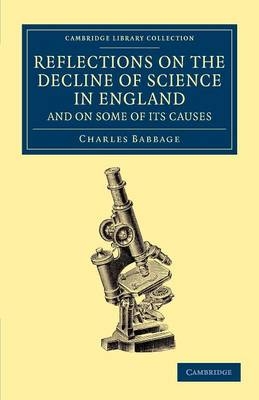
Reflections on the Decline of Science in England, and on Some of its Causes
Seiten
2013
Cambridge University Press (Verlag)
978-1-108-05265-8 (ISBN)
Cambridge University Press (Verlag)
978-1-108-05265-8 (ISBN)
Charles Babbage (1791–1871) was one of the most original thinkers of the nineteenth century. In this influential 1830 work, he highlighted the neglect of science by government and the Royal Society. His concerns found favour with many, and the publication was instrumental in the founding of the British Association.
The mathematician Charles Babbage (1791–1871) was one of the most original thinkers of the nineteenth century. In this influential 1830 publication, he criticises the continued failure of government to support science and scientists. In addition, he identifies the weaknesses of the then existing scientific societies, saving his most caustic remarks for the Royal Society. Asserting that the societies were operated largely by small groups of amateurs possessing only superficial interest and knowledge of science, Babbage explores the importance of the relationships between science, technology and society. Exposing the absence of a true scientific culture, he states, 'The pursuit of science does not, in England, constitute a distinct profession, as it does in other countries.' These concerns found favour with many, influencing reforms of the Royal Society and leading to the founding of the British Association.
The mathematician Charles Babbage (1791–1871) was one of the most original thinkers of the nineteenth century. In this influential 1830 publication, he criticises the continued failure of government to support science and scientists. In addition, he identifies the weaknesses of the then existing scientific societies, saving his most caustic remarks for the Royal Society. Asserting that the societies were operated largely by small groups of amateurs possessing only superficial interest and knowledge of science, Babbage explores the importance of the relationships between science, technology and society. Exposing the absence of a true scientific culture, he states, 'The pursuit of science does not, in England, constitute a distinct profession, as it does in other countries.' These concerns found favour with many, influencing reforms of the Royal Society and leading to the founding of the British Association.
Preface; Introductory remarks; 1. On the reciprocal influence of science and education; 2. Of the inducements to individuals, to cultivate science; 3. General state of learned societies in England; 4. General state of the Royal Society in particular; 5. Of observations; 6. Suggestions for the advancement of science in England; Conclusion; Appendices.
| Erscheint lt. Verlag | 14.2.2013 |
|---|---|
| Reihe/Serie | Cambridge Library Collection - Mathematics |
| Zusatzinfo | Worked examples or Exercises |
| Verlagsort | Cambridge |
| Sprache | englisch |
| Maße | 140 x 216 mm |
| Gewicht | 320 g |
| Themenwelt | Geschichte ► Teilgebiete der Geschichte ► Technikgeschichte |
| Naturwissenschaften | |
| ISBN-10 | 1-108-05265-7 / 1108052657 |
| ISBN-13 | 978-1-108-05265-8 / 9781108052658 |
| Zustand | Neuware |
| Haben Sie eine Frage zum Produkt? |
Mehr entdecken
aus dem Bereich
aus dem Bereich
Buch | Softcover (2024)
Lehmanns Media (Verlag)
19,95 €
Vom Perceptron zum Deep Learning
Buch | Softcover (2022)
Springer Vieweg (Verlag)
19,99 €
Digitalisierung neu denken für eine gerechte Gesellschaft
Buch | Hardcover (2023)
Quadriga (Verlag)
20,00 €


